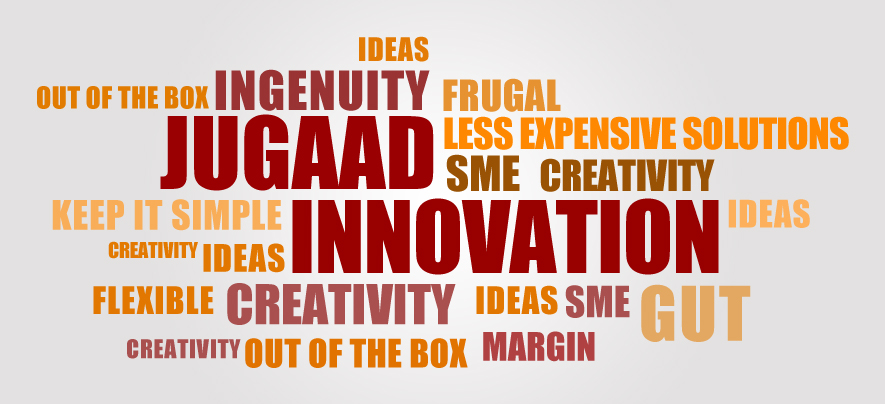Jugaad Innovation: Frugal & Flexible Approach to Business Success

ไอเดียและนวัตกรรม
563 week ago — ใช้เวลาอ่าน 7 นาที
If you’re a small or medium-sized business, your needs are quite different from those of larger multinational or national level businesses with greater resources and deeper pockets. Often, you are in competition with such businesses and you need to beat them to the customer’s wallet by using all your agility, ingenuity and speed of doing business. The challenge is therefore not to think like your large competitors. Think not like Goliath but like David.
Here’s how the concept of ‘Jugaad Innovation’ can help you expand your business and create a lucrative niche for yourself in today’s challenging and highly unpredictable environment.
1. Think 'just enough' strategies
Often, companies are so hell-bent on creating the perfect product for a customer that they sometimes lose sight of what features and functions the customer is actually going to use. Keeping an eye on precisely that helps not only reduce development times enabling products to get to market faster, it also decreases development costs and best of all, it plugs into the need gap at the right price. There’s plenty of opportunity in adversity.
For example, Yes Bank, a leading private bank in India, uses a mobile payment solution that allows money transfer via mobile phones, dispensing with the need for a bank account. This allows economically-marginalised villagers in remote parts of the country to access this service given that mobile penetration in India is very high (India is the world's second largest mobile phone market in terms of subscribers, with a total of 861.66 million mobile connections as on February 2013, as per Telecom Regulatory Authority of India.)
2. Develop less expensive, ingenious solutions
Jugaad means doing more with less. Often the solutions offered by the developed world just don’t work for lesser affluent communities. Understand who your market really is and create solutions that work for your markets.
Take the example of Embrace that has used just this principle to come up with a revolutionary product and business. Each year nearly twenty million babies are born prematurely, with a low birth weight, of which four million die. Of those who survive, many suffer from low IQ, diabetes and heart ailments. According to WHO, 75% of these babies can be saved simply if they could be kept warm. Safe and effective incubators made in the West cost megadollars (USD 20,000) and also need electricity, both of which are in short supply in developing nations.
Embrace developed a portable, low-cost incubator (USD 200) that needs just thirty minutes of electrical heating to keep the pouch warm for up to six hours at body temperatures. More usability at one percent of the cost!
21-year-old Yuri Malina co-founded Design for America and along with his DFA team, collaborated with a local Chicago hospital to design a portable ‘roll-on’ hand sanitizer that costs only USD 1.50 per unit and allows busy physicians and nurses the ability to clean their hands on the go. This is especially relevant in a context where nearly two million people get infected in the US during hospital visits and nearly a hundred thousand lives are lost.
3. Be flexible
The advantage in being small is that you can be more responsive to the needs of your customers and move quickly to find solutions. Learn from Google. The giant has structured itself as a flexible and dynamic network of small teams quick to sense and respond to the changing needs of the market. According to executive chairman Eric Schmidt, Google doesn’t have a two-year plan. Instead it has a ‘next-week’ plan.
Even with Embrace, being flexible in response to the customer’s needs meant changing the product. Initially, the product was planned for local hospitals. However on a trip to Nepal, the team realised that most premature babies are born at home in villages with little access to medical care. Accordingly, they created an infant warmer pouch that individual mothers could use. That’s jugaad rising to the occasion and being responsive to the customer’s requirements.
4. Keep it simple
The customer has finite resources, yet he wants the convenience and utility of a particular service or product. He needs you to innovate and give him what he needs in a simple and usable manner, no fuss, no frills.
Mansukh Prajapati, an entrepreneur in a remote desert area of western India, has used this principle to create ‘Mitticool”, a terracotta refrigerator that works without electricity. From a long line of potters, Mansukh bhai understands clay thoroughly and was able to use this inexpensive material to innovate smartly. Mitticool uses the cooling power of clay and evaporation to keep water, vegetables and dairy products cool, without electricity, at just USD 40! Plus it is completely biodegradable.
5. Say “Yes!” to the margin
Today’s jugaad solutions are inclusive and offer services to market segments that larger companies can’t service and therefore ignore.
Harish Hande set up Selco to provide rural communities with power. However, the challenge was not that easy as he realised that his potential customers couldn’t afford to buy and install his solar lighting systems upfront. Neither was there any economical way of maintaining them across a cluster of villages. His solution: To create a rural network of small-scale entrepreneurs who own and maintain the batteries and rent them out to customers on a pay-per-use model. Today, Selco has more than 125,000 households who use their solar lighting.
6. Go with your gut
Navigating an environment that is unpredictable, needs more than analysis. Jugaad innovators rely more on their intuition, which stems from being immersed in their customer’s needs and therefore being highly sensitive to what is likely to work. The lesson is in knowing your customer and the context in which he will use your product or service, so well, that you instinctively know the answers. Come out of the lab into the market and from there into the customer’s life – there is no better way to be successful.
โพสต์โดย
GlobalLinker StaffWe are a team of experienced industry professionals committed to sharing our knowledge and skills with small & medium enterprises.
เครือข่ายกับ SMEs ที่กล่าวถึงในบทความนี้
ดูโปรไฟล์ของ GlobalLinker
บทความอื่น ๆ ที่เขียนโดย GlobalLinker Staff
Declutter Your Business the Marie Kondo Way
48 week ago
5 Must-Have Emails for Your Online Store
83 week ago
Most read this week
Trending














Comments (2)
Share this content
Please login หรือ สมัครสมาชิก to join the discussion